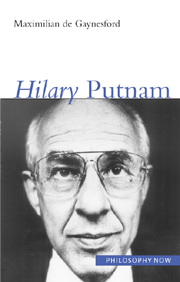8 - Science
from Part III - Content: earlier perspectives
Summary
Like the geometer who seeks attentively
But cannot grasp the axiom he needs
By thought on thought alone
Dante, Paradiso, XXXIII.133–5During his functionalist period, Putnam identified verificationism with a particular form of anti-realism that he labelled “the idealist tendency”: “even if it is not identical with the view that the ‘hard facts’ are just actual and possible experiences, it makes little sense to anyone who does not have some such metaphysical conviction lurking in his heart” (Putnam 1969: 441). And by this time, a robust realism had come to characterize his response to broadly verificationist ways of thinking. But he developed towards this position, and it is one that is actually antedated by his resistance to verificationism. So it is worth tracing the various reasons for his finding a particular form of realism increasingly attractive. And to do this effectively requires a return to the roots of his anti-verificationism.
Trivalence
In 1957, Putnam published a paper containing various ideas stimulated by the need to resolve problems posed by Reichenbach's Philosophic Foundations of Quantum Mechanics (1944), and in particular his description of various possible microcosmic physical situations. These situations are such that it is impossible to verify or show to be false certain statements describing them, and yet those statements seem empirically meaningful in a straightforward way. Putnam developed the problem by describing non-actual macrocosmic situations with this same feature.
- Type
- Chapter
- Information
- Hilary Putnam , pp. 88 - 96Publisher: Acumen PublishingPrint publication year: 2006



